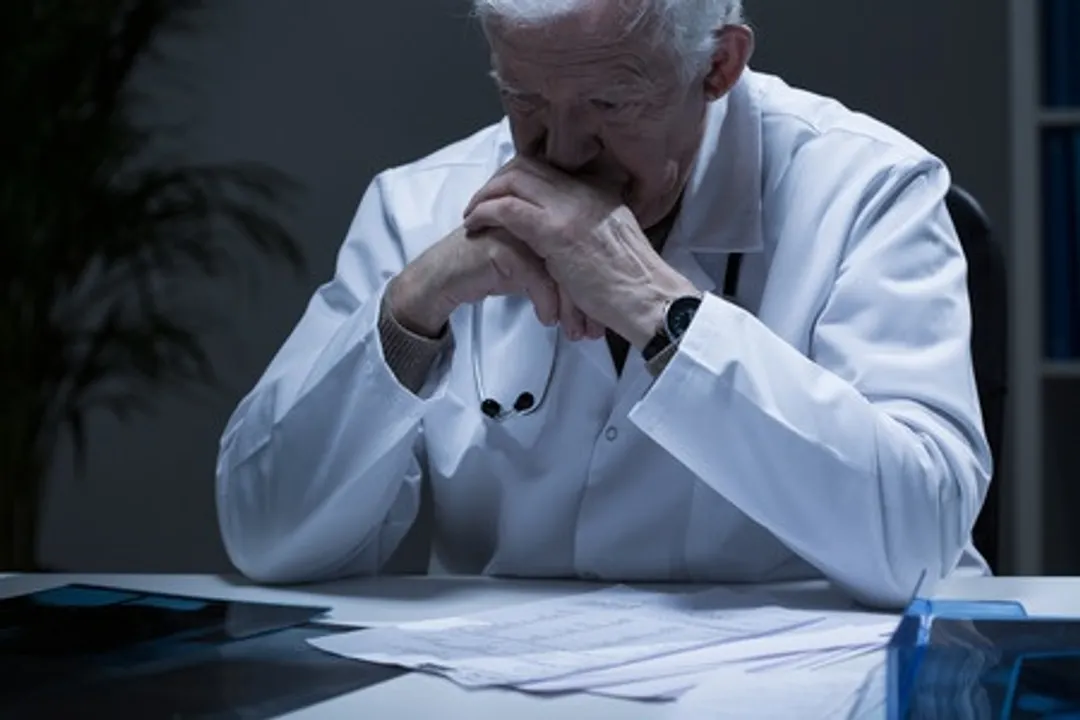Suffering in Silence: Can Physicians Truly Seek Mental Health Care?

Katarzyna Bia?asiewicz/123RF.com
It started with nightmares. I would wake up frightened, covered in sweat, and searching my empty room for an intruder. It progressed. I started setting traps on my doors to see if anyone was coming in to my apartment when I wasn’t there. I didn’t open my blinds often, and when I did, I ensured no one would be able to see inside. I meticulously planned movements outside my apartment - throwing away trash at noon when it’s brightest and other people were outside, checking all locks 3 times to ensure doors were secured.
I felt alone. I didn’t tell my friends of the verbal and past sexual abuse from my father. I couldn’t describe the horrific nightmares I had of my father chasing me and ultimately catching and killing me. I tried to mask the fear and shame.
I was depressed. My mother told me to “snap out of it.” My friends were perplexed that I could be so driven to achieve the seemingly impossible (becoming a doctor) when I counted bathing and eating a 200 calorie meal as an achievement.
My grades started to slip. I studied harder than ever ... 12 hours…. 16 hours…. 20 hours, with no improvements.
Then it happened. I was walking home after taking an exam. I stopped on the sidewalk and stared at the cars approaching from my left. I hadn’t felt like myself for a while. I was a body going through the motions. “It would be such a relief if you just walked in front of a car,” I thought. I was frightened. Who was I becoming? Why was my mind, my greatest asset and redeemer throughout all past hardships, taunting me?
I called for help. My only source of medical care at the time was discounted care, provided by many of our medical school teachers, in a local community clinic. I approached the receptionist. I knew her from orientation, and she recognized me from my earlier days in medical school. “Whatcha’ being seen for today?” she said, gleefully. “Depression,” I said. My face was expressionless, and I could tell it made her uncomfortable. “Oh. Okay. Sign here and take a seat”.
I recognized the resident as she walked into the exam room. She was a recent graduate from my medical school who was genuinely nice and respectful of everyone. “What’s going on?” she asked. I told her about how my father’s stalking had made be paranoid, isolative, anxious, and ultimately depressed. I told her how I romanticized sleep but feared the contents of my subconscious. I told her how I had been forcing myself to eat at least 3 spoons of oatmeal daily. I told her how worried I was that my grades were slipping, even though I was spending countless hours a day studying. “Have you had thoughts of hurting yourself?” she asked. “Yes. Today I felt like I was outside of my body and had the thought to walk in front of a car. It really scared me,” I said. “Are you feeling suicidal now?” “No.” She comforted and reassured me. It took time, but I got better.
It took me 4 months to sit down and write this story. While my fingers tap against the keyboard, my mind is transported to a time when I felt like a fish out of water—suffocating slowly and silently. My body still remembers the pain of sitting for hours on end in the fetal position of my apartment, shuffling papers and highlighters in an attempt to distract myself from my own emotions. I wasn’t alone in this. Jokingly, a staff member at my medical school made the comment later that more than half of the students were prescribed escitalopram for depression. That statement bothered me. His nonchalant behavior perplexed me. Doesn’t anyone want to know why so many students are depressed? Is anyone addressing this in any other way other than medication? Why isn’t this being discussed openly?
What are the statistics?
According to the American Foundation for Suicide Prevention, 300-400 physicians commit suicide every year, and those who do were less likely to have sought mental health care. Suicide among male physicians is 1.41 times higher than for the general population versus a shocking 2.27 increase for female physicians versus the general population. Medical residents are 20% more likely to experience a major depressive episode compared to the general population. Many physicians turn to self-medication with drugs and alcohol to alleviate anxiety, depressive symptoms, and stress. The research indicates that there is a serious problem that needs to be addressed.
Why don’t more physicians seek mental health care?
It’s simple: stigma. As much as healthcare professionals advocate for patients to receive comprehensive care, we don’t acknowledge that the same problems occur within our community. This is a cultural issue. In American society, physicians are seen as sort of superhuman, with the knowledge of a village elder, the health of body builder, and the stamina of a stallion. Since the days of WWII when work hours were first extended to accommodate the needs of the time, physicians have seen it as a rite of passage to work harder than the last generation and wear personal sacrifices as a badge of honor. Nowadays, it’s not so much that physicians are spending their time saving lives but instead completing paperwork. Some sources state that resident physicians spend up to 40% of their time completing ancillary tasks like charting, completing medication prior authorizations, and attending meetings. From personal experience I can say that it was the most depressing realization I made when I graduated from medical school. I’m still coming to terms with spending most of my time worrying about meticulous billing standards and productivity goals rather than time with patients. It’s a losing battle if you think about it too much.
What can you do?
The hope is that if you’re feeling mentally unstable, or your colleagues notice something is wrong, they would alert you or a higher authority, but in reality it often happens differently. In most situations I’ve encountered, there wasn’t a voiced concern until there was clear potential to harm patients or cause embarrassment to the hospital/school and the individual. The good news is that more physicians are speaking about their personal struggles and advocating for more comprehensive physician care (e.g. Dr. Pamela Wible, founder of Ideal Medical Care Movement). There is now a National Day of Solidarity to Prevent Physician and Med Student Suicide yearly where thousands of medical students and physicians gather to discuss their issues and commemorate the lives of those who we have lost to suicide. For those people needing more assistance, the Federation of State Physician Health Program provides a comprehensive website detailing contacts per state. Due to the stigma of mental illness (although ironic), it’s helpful to many to have a discreet resource as a first-contact. Also, most hospitals have an Employee Assistance Program to access a number of free counseling sessions.
The point is that physician self-care, both mental and physical, is vital to maintaining a healthy and productive workforce. I personally believe that there is a long way to go, but I’m hopeful because physicians are starting to be recognized as people who are just as complex as the patients we treat.
Related Posts
